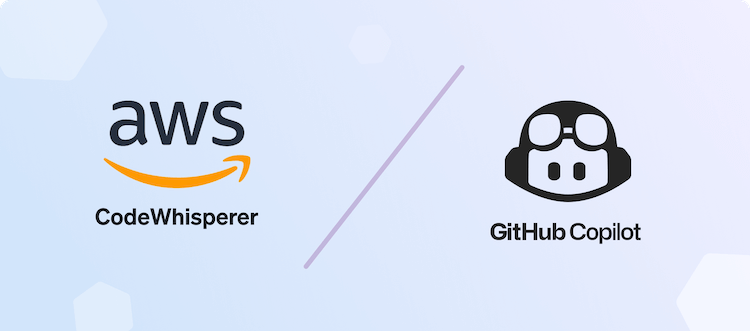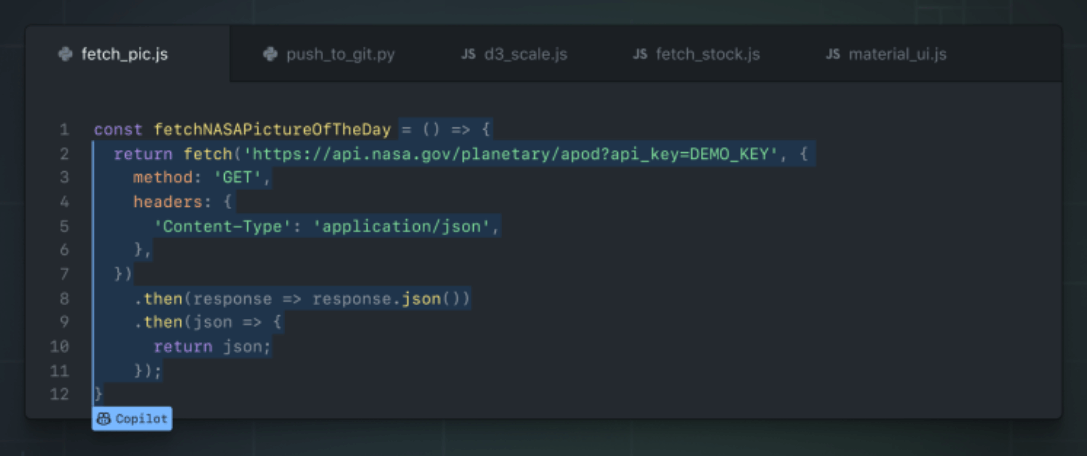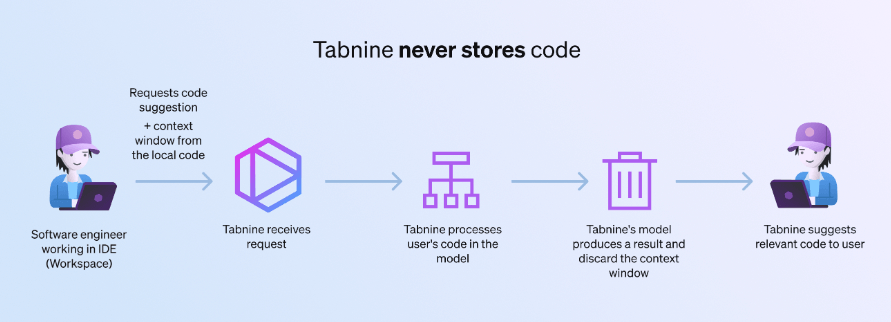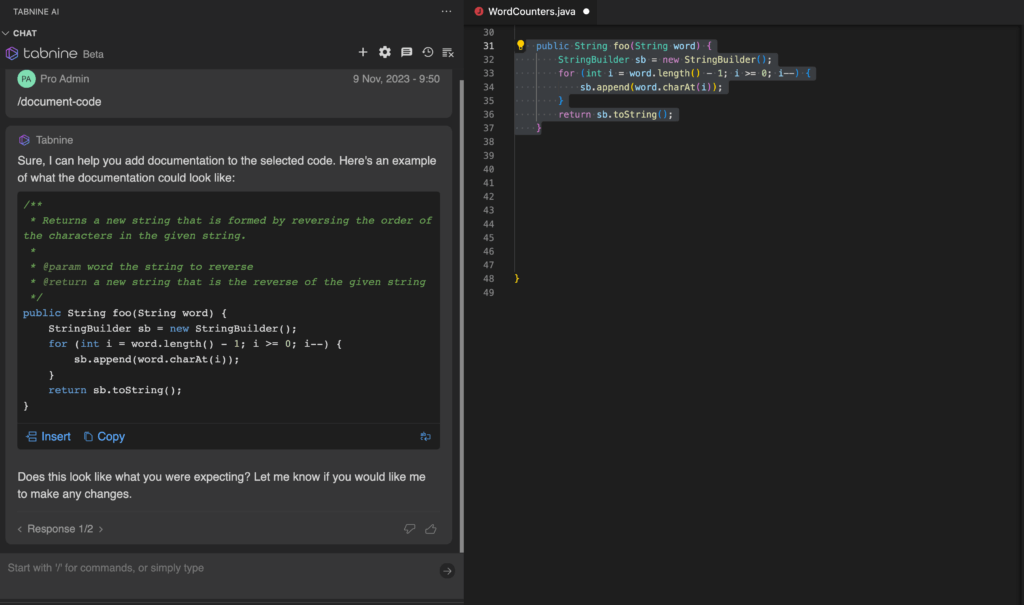GitHub Copilot vs. Amazon CodeWhisperer
Auto-completion tools are the ABC of increased productivity for developers. But what if those tools were even better? What if your code completion guessed what you wanted to write next and offered complete lines of code? That is what AI/ML-assisted coding is bringing to the table. In a few years, you’ll open an IDE without a coding assistant and get the feeling of a missing tool.
Along with Tabnine, the pioneer of AI coding assistants, Microsoft’s Github Copilot and Amazon’s CodeWhisperer are both part of the AI code assistant category for developers. Both tools do similar things, but which is better for you? We’ll cover the key features and differences between the two and help you find the right fit.
What is GitHub Copilot?
Built on top of OpenAI’s Codex model, Github Copilot is a code completion tool that offers generated code snippets based on context. Trained on billions of lines of code from public repositories (notably including code under both restrictive and permissive licenses), Copilot will make an educated guess and suggest complete lines of code as you type.
Announced in June 2021 with a limited beta, Copilot supports Python, JavaScript, TypeScript, Ruby, Go, C#, and C++ alongside other programming languages and frameworks.
An important caveat when using Copilot is, “You are responsible for ensuring the security and quality of your code.” When you write code with Copilot, you are the code reviewer, and you must read and understand the code and not blindly trust the AI. It’s also critical to note that, because of how the models were trained, Copilot may recommend code snippets learned from libraries with restrictive licenses. Before using Copilot in commercial software development, engineering teams should check with their legal and compliance teams to ensure they aren’t violating corporate policies.
GitHub Copilot features
AI-suggested code – Copilot will suggest code based on project context, style conventions you use, and your cursor’s location.
Multi-language support – Optimized for Python, JavaScript, TypeScript, Ruby, Go, C#, and C++, with more languages to come.
IDE Support – Visual Studio, Neovim, VS Code, and JetBrains.
Control Privacy – You get to choose how Copilot uses the data it collects from you.
Pros:
- Wide range of language and IDE Support.
- Immediate access.
- Built into the rest of the Microsoft software development stack
Cons:
- It sometimes uses variables that don’t exist.
- Trained on older code,it may not understand the context of newer libraries and frameworks.
- May generate code based on learnings from scanning restricted code libraries
What is Amazon CodeWhisperer?
Announced in June 2022 by Amazon, CodeWhisperer aims to help developer productivity using a machine learning (ML) service that generates code recommendations based on contextual information in the IDE, including the code and comments in natural language.
CodeWhisperer supports only Java, Javascript, and Python and supports the JetBrains IDEs, Visual Studio Code, and Amazon’s AWS Cloud9. Like many other tools, CodeWhisperer offers suggestions based on existing code and context, but CodeWhisperer also reads comments.
Amazon CodeWhisperer features
ML-suggested code – CodeWhisperer will read your comments and suggestions on which code to write to accomplish the task.
Popular IDE support – JetBrains (IntelliJ, PyCharm, and WebStorm), Visual Studio Code, AWS Cloud9, and the AWS Lambda console.
Works best with AWS APIs – CodeWhsiperer is built to work best with AWS APIs, including Amazon Elastic Compute Cloud (EC2), AWS Lambda, and Amazon Simple Storage Service (S3).
Comment Suggestions – CodeWhisperer will make comment suggestions, not only code suggestions.
Pricing:
Unknown at the time of writing.
Pros:
- Optimized for AWS, and biases towards those tools
- Strong security by design
- Encourages commented code
Cons:
- Limited languages at this time
Differences between GitHub Copilot and Amazon CodeWhisperer
Copilot already has a significant hold on the pair programming marketplace, being ahead of CodeWhisperer in the market by a year. It is unclear at this stage if CodeWhiserer has what it takes to establish itself as a significant competitor.
One of the most critical differences between Copilot and CodeWhisperer is the training code used for the AI. While Copilot relies heavily on GitHub public repositories, CodeWhisperer is learning from in-house code and also offers the ability to flag or filter code suggestions that resemble training data to allow developers to check license compliance.
Tabnine — the AI coding assistant that you control
Whether you are choosing an AI coding assistant to make your life easier as an individual developer or choosing a tool to deploy out to your entire engineering team in order to improve the effectiveness and satisfaction of your team, it’s critical to evaluate potential vendors holistically:
- Does the AI coding assistant offer a comprehensive platform with in-line code completions and support via chat?
- Does the vendor support the full variety of IDEs and languages your team currently utilizes?
- Does the AI coding assistant leverage world-class models? Are they able to evolve their models as the technology improves?
- Can the AI platform be optimized for your engineering team with tailored models and context-awareness?
- Does the vendor offer complete privacy for your codebase and data around usage? Do they offer air-gapped deployments (on-premise or VPC) and/or guaranteed zero data retention?
- Was the AI coding assistant trained exclusively on code with permissive licenses? Does the vendor offer protection from legal risk by limiting the recommendations to software you have the rights to and not just promises of indemnification?
- Can the vendor you are choosing meet your company’s expectations for security and compliance?
Only Tabnine meets all of these requirements expected by enterprise engineering teams and has the history and scale of developer adoption to prove it.
Since launching our first AI coding assistant in 2018, Tabnine has pioneered generative AI for software development. Tabnine helps development teams of every size use AI to accelerate and simplify the software development process without sacrificing privacy & security. Tabnine boosts engineering velocity, code quality, and developer happiness by automating the coding workflow through AI tools customized to your team. With more than one million monthly users, Tabnine typically automates 30-50% of code creation for each developer and has generated more than 1% of the world’s code.
Unlike generic coding assistants, Tabnine is the AI that you control:
Tabnine ensures the privacy of your code and your engineering team’s activities. Tabnine lives where and how you want it to — deployed as protected SaaS for convenience, on-premises for you to lock down the environment, or on Virtual Private Cloud for the balance of the two. Tabnine guarantees zero data retention, and we never use your code, data, or behaviors to feed our general models.
Personalized
Tabnine is personalized to your team for optimal impact on your business. Tabnine is built on best of breed large language models (with the flexibility to switch as new models emerge or improve), while giving you the ability to fine tune or deploy fully customized models. Tabnine is context-aware of your code and patterns, delivering recommendations based on your internal standards and engineering practices.
Tabnine works the way you want, in the tools you use. Tabnine supports a wide scope of IDEs and languages, improving and adding more all the time. Tabnine also provides engineering managers with visibility into how AI is used in their software development process and the impacts it is having on team performance.
Secured
Tabnine is secure and trusted. Tabnine believes in building trust through Algorithmic transparency, and thus shares how our models are built and trained with our customers. Furthermore, we are relentlessly focused on protecting our customers interests by only training on code with permissive licenses and only returning code recommendations that will not be subject to future questions of ownership and potential litigation. We respect open source code authors and their rights as well as the rights of each and every one of our customers.
As you should expect from any vendor, Tabnine offers proven, enterprise-grade security and meets key industry standards.
Get started with Tabnine for free today, or contact us to learn how we can help your engineering team be happier and more productive.
The future of AI for code is here
There are some small but significant differences between Copilot and CodeWhisperer, such as the fact that Copilot bases its suggestions on context and style while CodeWhsiperer reads your comments.
If you’re using AWS Cloud9, Lambda, or writing in Java, CodeWhisperer would be your first choice. But if you’re looking to code in a different language or IDE, Copilot will answer your call. If you’re operating in the small overlap between the two, I suggest you give Copilot a go first due to its higher popularity and stability over the past year.
You should be aware there are alternatives to Copilot and CodeWhisperer that have been around for a while. Tabnine supports many IDEs, Rich Text Editors, and languages. You can use the AI-trained auto-completion tool on public repositories for free or pay a subscription fee to train the AI on your private repositories to match your style.
The world of software development is rapidly evolving, with the integration of AI being one of the biggest driving forces. To remain competitive and relevant in this constantly changing landscape, it’s essential to stay up-to-date with the latest advancements and trends. By harnessing the power of AI, software engineers can streamline development processes, reduce errors, and improve software quality.






